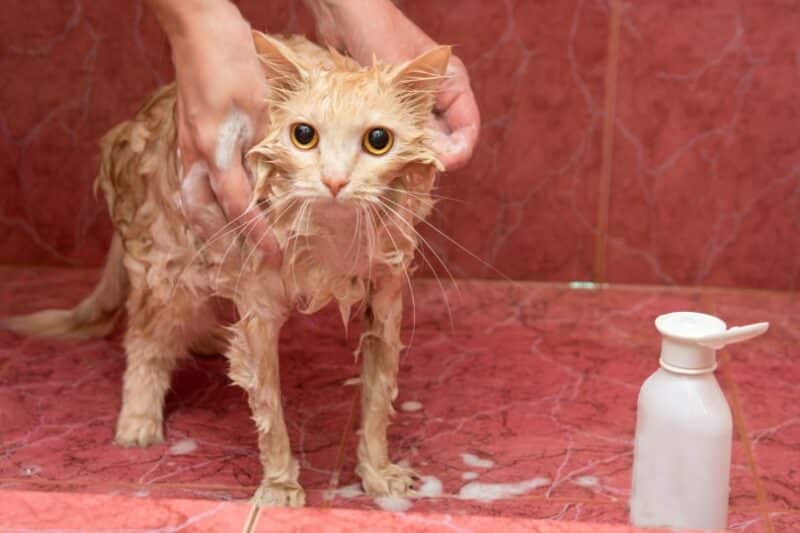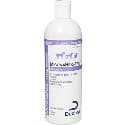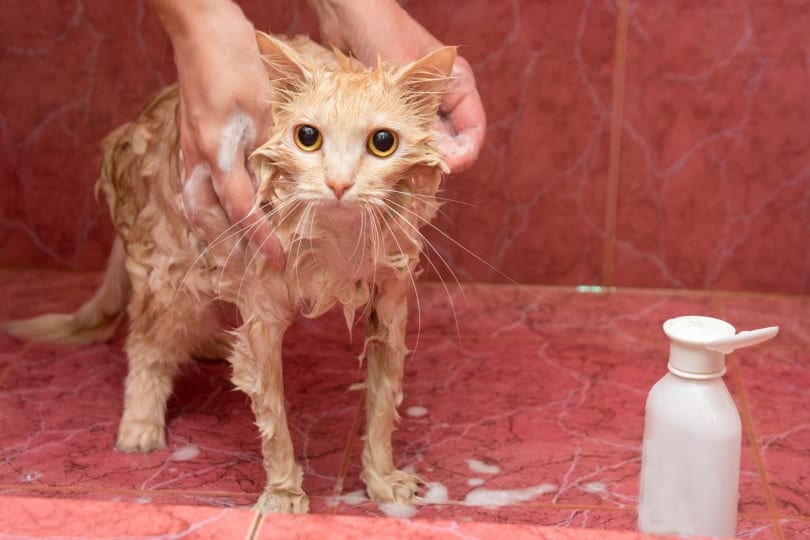
If you suspect a fungal infection on your cat, you should contact your vet for specific advice and recommendations for shampoo. That said, if you are looking to treat mild signs and prevent harsher infections, with your vet’s permission, you can treat them at home with an over-the-counter pet shampoo.
We know that you only want the best for your sensitive kitty, so here are detailed reviews of the top picks of the market.
Some fungal infections that can affect cats can also infect humans; this can be accompanied by severe pain and long-term treatments for humans in some cases. If you suspect your cat has a fungal infection, it is very important to seek veterinary care rather than attempting to just treat them at home with a shampoo.
If you suspect that your cat has infected you, or if your cat has a sporotrichosis infection (as diagnosed by your veterinarian), you should seek treatment and guidance from your medical doctor for yourself promptly.
A Quick Look at Our 2024 Favorites
| Image | Product | Details | ||
|---|---|---|---|---|
| Best Overall |

|
Vetoquinol Universal Medicated Shampoo |
|
CHECK PRICE |
| Best Value |
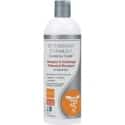
|
Veterinary Formula Clinical Care Antiseptic & Antifungal Shampoo |
|
CHECK PRICE |
| Premium Choice |
|
MiconaHex+Triz Shampoo |
|
CHECK PRICE |
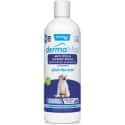
|
Vetnique Labs Dermabliss Medicated Shampoo Anti-Bacterial |
|
CHECK PRICE | |

|
Ark Naturals Neem Protect Dog & Cat Shampoo |
|
CHECK PRICE |
The 9 Best Antifungal Shampoos for Cats
1. Vetoquinol Universal Medicated Shampoo — Best Overall

| Active ingredients | Chloroxylenol, salicylic acid, sodium thiosulfate |
| Size | 16 oz. or 1 gallon |
| Scent | Fragranced |
Vetoquinol Universal Medicated Shampoo is our pick for the best overall antifungal shampoo for cats. This affordable product has many positive reviews from delighted pet owners.
This product is highly effective in treating external fungus infections. Additionally, it is thoroughly cleansing, so it helps to remove scales and flakes of affected skin. We like that it does not interfere with other topical treatments, such as flea-and-tick treatments.
The ingredient list does include added fragrances, which may irritate extra-sensitive skin. It also has a thick consistency, but some owners use water to dilute the solution for easier application. Overall, most owners see a significant difference in one to two washes.
- Deeply cleansing
- Doesn’t interfere with other topical treatments
- Fast acting
- Artificial fragrance
- Thick liquid difficult to distribute
2. Veterinary Formula Clinical Care Antiseptic & Antifungal Shampoo — Best Value

| Active ingredient | Ketoconazole, Benzethonium Chloride |
| Size | 16 oz. or 1 gallon |
| Scent | Fragranced |
Veterinary Formula Clinical Care Antiseptic & Antifungal Shampoo blends effectiveness and affordability to be the best antifungal shampoo for cats for the money. With a low cost and many positive reviews, it’s a great value choice.
In addition to fungal-fighting chemicals, it contains nourishing coconut oil and soothing aloe vera to care for the skin during treatment. The recipe is free from moisture-stripping parabens, so skin retains moisture while actively fighting fungal infections.
However, this shampoo typically has to be used twice a week for meaningful results, which might not sit well with all owners (or more importantly, their cats). Some people have claimed that it doesn’t have deep cleansing properties, so a pre-wash might be necessary if you want a deep wash.
- Aloe vera soothes the skin
- Free from drying parabens
- Deodorizing
- Don’t always clean deeply
- Artificial fragrance
3. MiconaHex+Triz Shampoo — Premium Choice

| Active ingredients | Miconazole, chlorhexidine |
| Size | 8 or 16 oz. |
| Scent | Fragrance-free |
MiconaHex+Triz Shampoo offers multifunctional approaches. Not only is it antifungal, but it is also antibacterial and moisturizing. The antibacterial qualities tackle harmful bacteria that can worsen fungal infections of the skin, while moisturizing properties reduce irritation.
For extra skin soothing, the formula contains natural essential oils. Fungal infections and their treatments can cause dry and sore skin, so these soothing effects can increase your cat’s comfort while they kick their infection.
Of course, these extra features will result in a higher price than other shampoos. Ultimately, you can save money, as you won’t need additional products for fighting bacteria or restoring moisture to the skin. It also requires a veterinarian’s prescription to use.
- Moisturizing properties
- Lavender and lemongrass oil for soothing
- Antibacterial for skin infections
- Costly
- Prescription required
4. Vetnique Labs Dermabliss Medicated Shampoo Anti-Bacterial & Anti-Fungal

| Active ingredients | Chlorhexidine, ketoconazole |
| Size | 16 oz. |
| Scent | Fragranced |
Vetnique Labs Dermabliss Medicated Shampoo Anti-Bacterial & Anti-Fungal is backed by hordes of positive reviews. Within those are people who swear by this product to ease the skin alignments of rescued cats and dogs.
It features two active ingredients: ketoconazole for antifungal and chlorhexidine for antibacterial. Its powerful formula tackles the fungal issues at the source to reduce itching and discomfort. As a bonus, it’s deodorizing!
However, this product is for medication purposes, not nourishment. Excess usage may dry out the skin and the coat of natural oils, so a moisturizing treatment is recommended after use.
- Two active ingredients
- Deodorizing
- Well reviewed
- May dry out the coat and skin
5. Ark Naturals Neem Protect Dog & Cat Shampoo

| Active ingredient | Neem oil |
| Size | 8 oz. |
| Scent | Fragranced |
For a more natural approach to mild skin irritations, Ark Naturals Neem Protect Dog & Cat Shampoo uses the power of neem oil. Neem can help your cat when they’re just mildly itchy or when they’ve recovered from their ordeal and you wish to switch to a non-medicated shampoo.
However, it’s not a powerful enough recipe to battle an active fungal infection, and prescribed veterinary treatment should be utilized. This shampoo is not used to fight off fungi organisms on the skin. However, it can also be used regularly as a preventative measure for cats prone to infection.
The natural formula is free from sulfates and parabens, so it won’t strip the skin of oils, causing increased irritation. Ark also claims this product to be eco-friendly.
- Free from drying sulfates and parabens
- Neem oil lessens itchiness and nourishes the skin
- Eco-friendly formula
- Not suitable for active fungal infections
- Strongly scented
6. Pet MD Antiseptic & Antifungal Medicated Dog, Cat & Horse Shampoo

| Active ingredients | Chlorhexidine, ketoconazole |
| Size | 16 oz. |
| Scent | Fragranced |
Pet MD Antiseptic & Antifungal Medicated Dog, Cat & Horse Shampoo ticks a lot of boxes. It’s effective as an antibacterial and antifungal while limiting skin dryness and itching. It’s a helpful treatment for suffering cats and an effective preventative measure.
Most reviewers rated this product highly, but one warning was emphasized. The shampoo is red/orange colored, and if not adequately rinsed from the fur, it can cause staining on light-colored pets. If your cat has a lush white coat, maybe this product is not for you.
- Suitable for treatment and prevention
- Cleansing
- Can stain white coats
- Poor lather
7. Davis Miconazole Dog & Cat Shampoo

| Active ingredients | Miconazole |
| Size | 12 oz. |
| Scent | Fragrance free |
For targeted treatment of fungal skin infections, Davis Miconazole Dog & Cat Shampoo brings together active chemicals and natural remedies. The two main active ingredients are miconazole, which is a strong antifungal, and ground oatmeal, which has anti-inflammatory effects.
The absence of dyes and fragrances makes the formula gentle on irritated skin. Additionally, aloe vera and fatty acids nourish the skin. It also contains emollients—medical-grade moisturizers—to protect the skin from moisture loss.
It’s not a good shampoo for coat cleaning, though, and the lather is poor, meaning lots of the product is needed for total coverage.
- Emollients for deep moisturization
- Dye and fragrance free
- Contains aloe vera and fatty acids
- No cleansing properties
- Poor lather
8. Douxo S3 PYO Antiseptic Antifungal Chlorhexidine Dog & Cat Shampoo
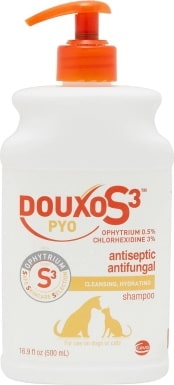
| Active ingredients | Ophytrium, chlorhexidine |
| Size | 7 oz. |
| Scent | Fragranced (hypoallergenic) |
Douxo S3 PYO Antiseptic Antifungal Chlorhexidine Dog & Cat Shampoo has a bonus antifungal effect, making it a good choice for many. It effectively cleans and moisturizes the coat, so a separate cleaning shampoo is not required in addition to a fungal wash.
Ophytrium works to restore natural microbe balance on the skin, promoting self-healing of fungal infections.
While this product is fragranced, the active scent is hypoallergenic. However, many reviewers don’t like the recent formula change from Douxo, as it is now ineffective for their pets that used the previous shampoo for a long time.
- Effective cleanser and moisturizer
- Easy-to-use pump action bottle
- Restores microbe balance
- Costly
- Recent recipe change
9. Strawfield Pets Chlorhexidine Medicated Dog, Cat & Horse Shampoo
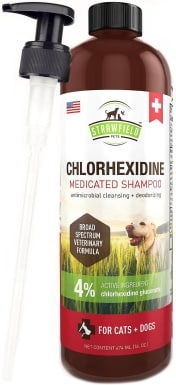
| Active ingredient | Chlorhexidine |
| Size | 16 oz. |
| Scent | Fragranced |
Strawfield Pets Chlorhexidine Medicated Dog, Cat & Horse Shampoo has just one active ingredient: chlorhexidine. However, it is present in a large amount, potentially offering a better result for some fungal infections.
The formula is “sting free,” so treatment can be more comfortable despite the strength. It is already troubling enough bathing a cat, let alone when the shampoo is causing discomfort or irritation.
The thickness of the recipe is difficult for owners to work with, especially as it is hard to pump out, reducing the convenience of a hand pump bottle. However, it’s a good general shampoo and may work well for your cat.
- Doesn’t sting
- 4% chlorhexidine
- Thickness is challenging to work with

Buyer’s Guide — How to Find the Right Antifungal Shampoo
Skin Fungal Infections in Cats
Fungal infections in cats are caused by the presence of fungi spores on the skin. They inhabit the host for survival and cause pain and discomfort. The most common infections are external and are present on the skin, and these can be treated with medicated shampoos. Other infections can be systematic or internal, where they can cause some more serious damage.
Your vet can diagnose a fungal skin infection by a physical examination coupled with other diagnostic tests. From there, they will usually offer an appropriate treatment plan.
This is where medicated shampoos can have their use. Washing with antifungal shampoo can battle fungal spores and help expedite your cat’s recovery from some fungal infections.
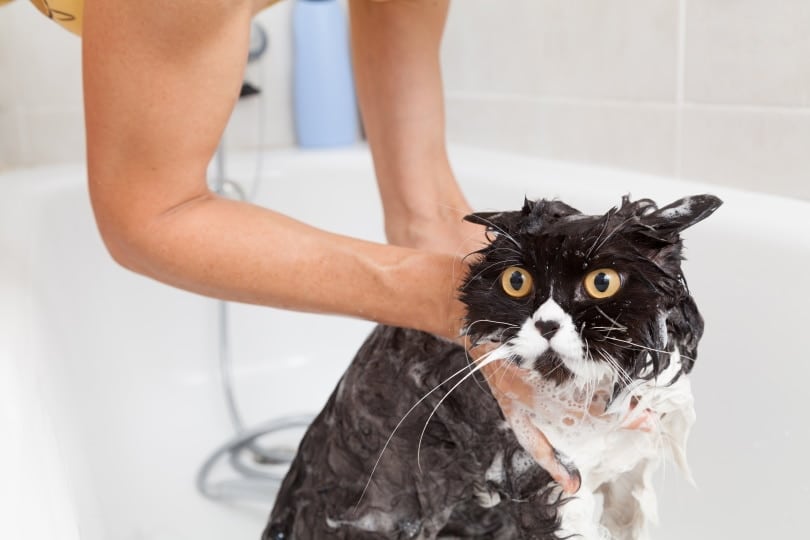
What to Look For in Antifungal Shampoos
Active Chemicals
Natural remedies may help keep your cat’s skin healthy and aid in prevention. But for established fungal infections, medically verified and tested measures should be taken to avoid worsening the condition. Active antifungal chemicals can target infections by destroying fungi and inhibiting the growth of spores or hyphae.
Not all active ingredients will work on every type of fungus. Once your vet identifies the culprit, they can tell you which ingredient will work best to destroy it.
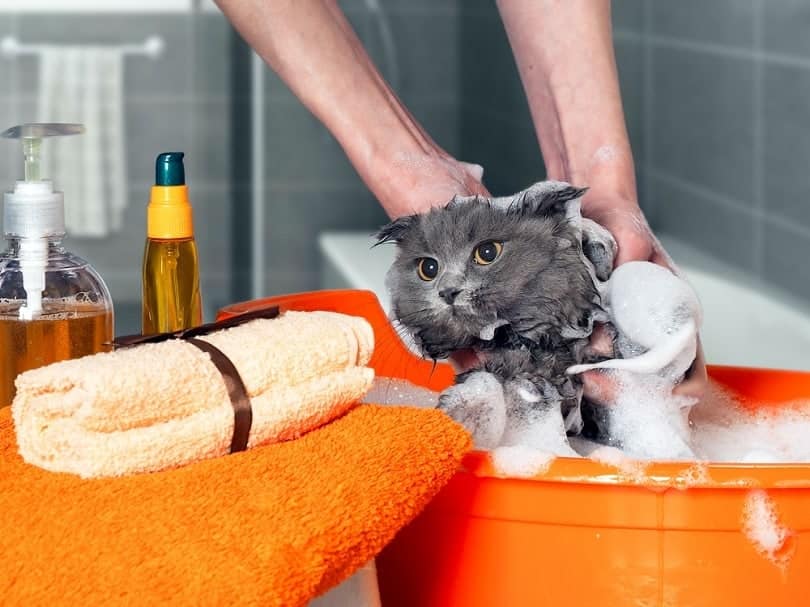
Helpful Additives
Alongside a powerful active ingredient, shampoos with additional ingredients can boost the shampoo’s efficiency. These ingredients often act as emulsifiers, while others can act as skin soothers and moisturizers.
Examples of such ingredients include the following:
- Oatmeal
- Aloe vera
- Vitamin E
- Coconut oil
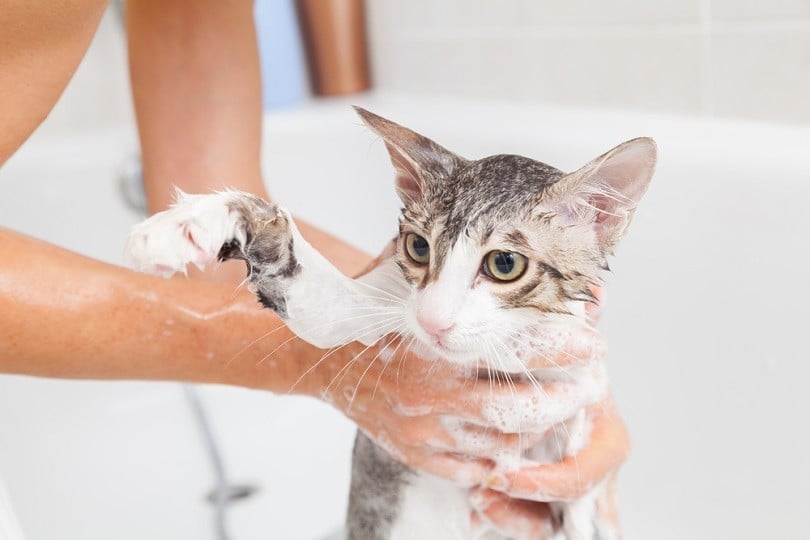
No Unnecessary Ingredients
For medicated shampoos, you don’t want a product with many other ingredients that traditional shampoos have. Many shampoo ingredients clean hair by stripping natural oils, and this drying effect can increase the irritation of affected skin.
Avoid ingredients like parabens and sulfates. Added fragrances can be harmful to sensitive skin. You know your cat better than anyone; if they are super sensitive, choose a fragrance-free shampoo.
Conclusion
Getting a fungal infection certainly is not pleasant for either your cat or yourself. Choosing the right product to deal with it will make all the difference in your cat’s comfort and quality of life.
Our favorite product among these reviews was Vetoquinol Universal Medicated Shampoo. It acts quickly to offer instant relief for your cat. Customers hardly had a negative thing to say about this product. It has provided great results to many pets and their owners.
For great value, we like Veterinary Formula Clinical Care Antiseptic and Antifungal Shampoo. For such an affordable price, this product packs a punch—an excellent choice for treating fungal infections.
Featured Image Credit: Madhourse, Shutterstock
Contents
- A Quick Look at Our 2024 Favorites
- The 9 Best Antifungal Shampoos for Cats
- 1. Vetoquinol Universal Medicated Shampoo — Best Overall
- 2. Veterinary Formula Clinical Care Antiseptic & Antifungal Shampoo — Best Value
- 3. MiconaHex+Triz Shampoo — Premium Choice
- 4. Vetnique Labs Dermabliss Medicated Shampoo Anti-Bacterial & Anti-Fungal
- 5. Ark Naturals Neem Protect Dog & Cat Shampoo
- 6. Pet MD Antiseptic & Antifungal Medicated Dog, Cat & Horse Shampoo
- 7. Davis Miconazole Dog & Cat Shampoo
- 8. Douxo S3 PYO Antiseptic Antifungal Chlorhexidine Dog & Cat Shampoo
- 9. Strawfield Pets Chlorhexidine Medicated Dog, Cat & Horse Shampoo
- Buyer’s Guide — How to Find the Right Antifungal Shampoo

